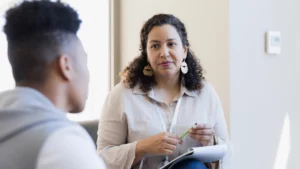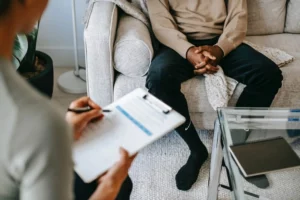Relationship OCD (Obsessive-Compulsive Disorder) is a condition that affects individuals who experience intrusive and unwanted thoughts, doubts, and fears about their romantic relationships. These obsessions can lead to significant distress and interfere with daily life. In this article, we will find out the role of a Relationship OCD therapist and the benefits of seeking therapy for this particular disorder.
Contents
What Is Relationship OCD?
 Relationship Obsessive-Compulsive Disorder (ROCD) is a subtype of Obsessive-Compulsive Disorder (OCD) that involves intrusive and persistent ideas, suspicions, and apprehensions related to romantic relationships. People with ROCD experience excessive uncertainty and anxiety about their relationships.
Relationship Obsessive-Compulsive Disorder (ROCD) is a subtype of Obsessive-Compulsive Disorder (OCD) that involves intrusive and persistent ideas, suspicions, and apprehensions related to romantic relationships. People with ROCD experience excessive uncertainty and anxiety about their relationships.
Individuals with ROCD often have recurrent doubts and intrusive thoughts about their partner, their compatibility, their level of attraction, or the overall quality of the relationship. These thoughts can lead to a heightened sense of uncertainty and distress. In response to these thoughts and fears, individuals with ROCD may engage in compulsive behaviors.
ROCD can cause significant distress and interfere with the ability to form and maintain healthy relationships. It can create a cycle of doubt, nervousness, and obsessive manners that can strain the relationship itself. This condition is different from the normal doubts and concerns that may arise in relationships, as it involves an excessive and intrusive nature that significantly impacts the person’s daily functioning.
Why Does OCD Arise In Relationships?
 There are multiple reasons that may arise OCD in relationships and all these factors are having significant effects on a successful bond.
There are multiple reasons that may arise OCD in relationships and all these factors are having significant effects on a successful bond.
Here are some reasons why OCD arises in relationships:
- Genetic and biological factors: There is evidence to suggest that OCD, including ROCD, can have a genetic component. Research has shown that individuals with a family history of OCD are more likely to develop the disorder themselves.
- Cognitive and emotional factors: Individuals with OCD, including ROCD, often have a tendency to overanalyze their thoughts and emotions. They may be more prone to excessive worry and doubt, and they may interpret normal relationship uncertainties as significant problems.
- Learned behaviors and conditioning: Traumatic or distressing relationship experiences, such as infidelity or abandonment, can contribute to the development of ROCD. These experiences may lead individuals to develop obsessive thoughts and compulsive behaviors as a way to cope with their fears and anxieties.
- Perfectionism and high relationship standards: Individuals with ROCD often have high standards and expectations for their relationships. They may strive for perfection and become excessively focused on minor flaws or uncertainties.
It’s important to note that the development of OCD in relationships are likely influenced by a combination of many elements.
How Does Relationship OCD Therapist Help Couples?
 A Relationship OCD therapist can provide valuable support and guidance to couples who are struggling with Relationship Obsessive-Compulsive Disorder (ROCD).
A Relationship OCD therapist can provide valuable support and guidance to couples who are struggling with Relationship Obsessive-Compulsive Disorder (ROCD).
Here are some ways in which a therapist can help:
- Diagnosis and assessment: A therapist can assess the presence of ROCD by conducting a thorough evaluation of each partner’s symptoms, experiences, and relationship dynamics. They will work to understand the specific challenges faced by the couple and determine if ROCD is a contributing factor.
- Emotion regulation and coping skills: The therapist will assist the couple in developing strategies to manage anxiety and uncertainty related to ROCD. This may include teaching techniques for emotion regulation, stress reduction, and enhancing self-care practices.
- Addressing relationship issues: ROCD often involves concerns and conflicts within the relationship. The therapist will help the couple identify and address these issues, such as trust, communication, or intimacy problems, and work towards improving the overall quality of the relationship.
- Support and validation: A Relationship OCD therapist provides a safe and non-judgmental space for the couple to express their fears, doubts, and anxieties. They offer support, validation, and guidance throughout the treatment process, fostering hope and motivation for positive change.
It’s important to note that the specific approach and techniques used by therapists may vary. Finding a therapist who specializes in OCD and has experience in working with couples can be beneficial for effectively addressing issues within the context of the relationship.
Find Top Online OCD Therapists
Therapies Are Considered To Treat Relationship OCD
There are several therapeutic approaches that are considered effective in treating Relationship Obsessive-Compulsive Disorder (ROCD). Here are some commonly used therapies:
Cognitive-Behavioral Therapy (CBT)
CBT is a widely used and evidence-based therapy for OCD, including ROCD. It focuses on identifying and challenging irrational thoughts and beliefs (cognitive restructuring) that contribute to ROCD symptoms. Exposure and Response Prevention (ERP), a specific component of CBT, involves gradually exposing individuals to situations that trigger their OCD-related anxieties and preventing the accompanying compulsive behaviors.
Acceptance & Commitment Therapy (ACT)
 ACT is a therapeutic approach that emphasizes accepting and embracing distressing thoughts and emotions while taking actions aligned with personal values. It helps individuals develop psychological flexibility and reduce their struggle with unwanted thoughts and doubts. In the context of ROCD, ACT may help individuals cultivate a more accepting and compassionate stance.
ACT is a therapeutic approach that emphasizes accepting and embracing distressing thoughts and emotions while taking actions aligned with personal values. It helps individuals develop psychological flexibility and reduce their struggle with unwanted thoughts and doubts. In the context of ROCD, ACT may help individuals cultivate a more accepting and compassionate stance.
Mindfulness-Based Therapies
Mindfulness-based approaches, such as Mindfulness-Based Cognitive Therapy (MBCT) and Dialectical Behavior Therapy (DBT), can be beneficial for managing ROCD symptoms. These therapies emphasize present-moment awareness and non-judgmental acceptance of thoughts and feelings. By cultivating mindfulness skills, individuals can reduce reactivity to their intrusive thoughts and develop a greater sense of control over their responses.
Couples Therapy
In addition to individual therapy, couples therapy can play a significant role in treating ROCD. Couples therapy focuses on improving communication, understanding each other’s perspectives, and addressing relationship issues that contribute to ROCD-related distress. Therapists may use various approaches, such as Emotionally Focused Therapy (EFT) or the Gottman Method of Couples Therapy.
Medication
In some cases, medication, specifically selective serotonin reuptake inhibitors (SSRIs), may be prescribed alongside therapy to help manage the symptoms of ROCD. Medication can help regulate neurotransmitter imbalances in the brain and reduce anxiety and obsessive thoughts. However, it’s important to note that medication alone is not considered a comprehensive treatment for ROCD and is often used in conjunction with therapy.
How To Find A Relationship OCD Therapist Near Me?
 To find a Relationship OCD therapist near you, you can follow these steps:
To find a Relationship OCD therapist near you, you can follow these steps:
- Contact mental health helplines: Reach out to mental health helplines in your country or region. They can provide information about therapists specializing in OCD or relationships and guide you to appropriate resources.
- Seek referrals: Ask your primary care doctor, psychiatrist, or other healthcare professionals if they can recommend a Relationship OCD therapist. You can also ask friends, family, or support groups for any recommendations they might have.
- Check with local mental health organizations or clinics: Contact local mental health organizations, community mental health centers, or universities that offer psychology or counseling programs. They may have referral services or clinics that specialize in OCD or relationship therapy.
- Verify therapist credentials: Once you find potential therapists, verify their credentials and qualifications. Ensure they are licensed or certified in your area and have expertise in treating OCD or providing couples therapy.
- Consider logistics and preferences: Take into account practical factors such as location, availability, fees, and insurance coverage. Additionally, consider your personal preferences, such as the therapist’s gender, therapeutic approach, and cultural sensitivity.
- Reach out and schedule consultations: Contact the therapists you are interested in and schedule initial consultations. This is an opportunity to discuss your specific needs, ask questions, and determine. If the therapist is a good fit for you and your situation.
Remember, finding the right therapist may take time and effort. It’s essential to work with a qualified professional who has experience in treating Relationship OCD or OCD in general.
Is Relationship OCD Therapy Expensive?
 The cost of Relationship Obsessive-Compulsive Disorder (ROCD) therapy can vary depending on various factors, such as the location, qualifications, and experience of the therapist, duration of therapy, and the type of therapy provided. But for an idea, it is ranging from $300-$700 per session. Therapy fees are typically set by the therapist and can range from affordable to more expensive.
The cost of Relationship Obsessive-Compulsive Disorder (ROCD) therapy can vary depending on various factors, such as the location, qualifications, and experience of the therapist, duration of therapy, and the type of therapy provided. But for an idea, it is ranging from $300-$700 per session. Therapy fees are typically set by the therapist and can range from affordable to more expensive.
It’s important to note that therapy costs can vary significantly between different regions and countries. However, there are options available to help manage the cost of ROCD therapy. These include checking if your health insurance provides coverage for mental health services. While exploring sliding scale fees offered by some therapists based on income, and seeking therapy through non-profit organizations or community mental health clinics that may offer reduced rates.
Conclusion
In conclusion, a Relationship OCD therapist provides valuable support and guidance for individuals and couples dealing with ROCD. Through specialized therapies such as CBT and couples therapy, therapists help clients challenge intrusive thoughts, improve communication, and address relationship issues. While costs may vary, therapy offers an investment in well-being and relationship satisfaction. Collaborating with a skilled therapist increases the chances of positive outcomes and improved quality of life.
At CoupleMantra our experienced relationship therapists are here to provide you the support and tools you need to heal, grow, and thrive together. Book a trial Online Couple Counseling.


